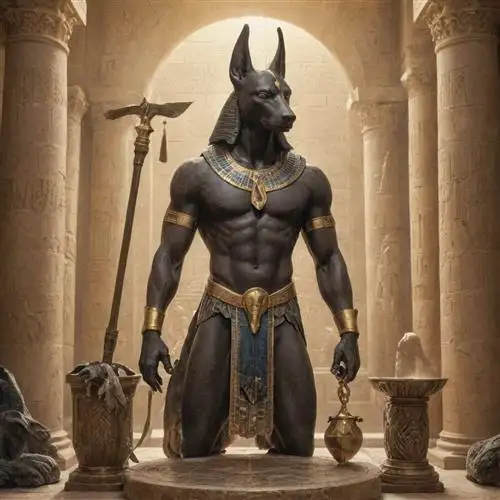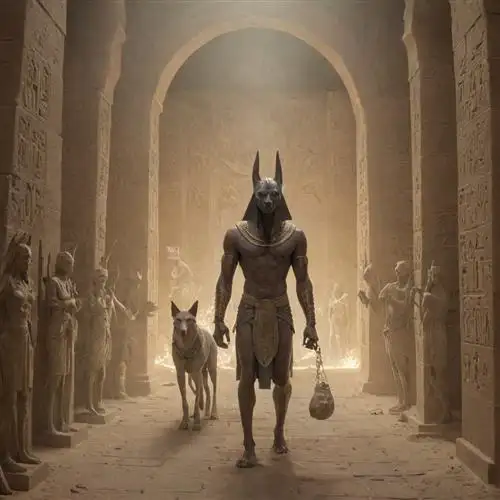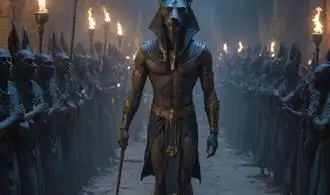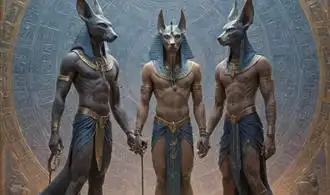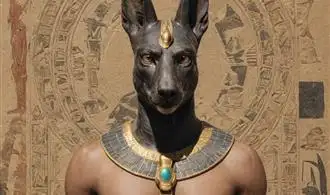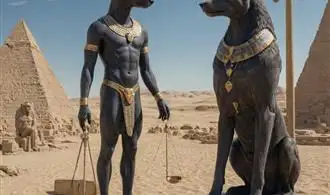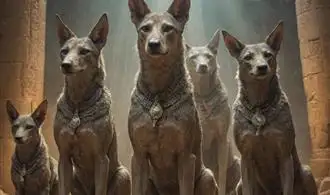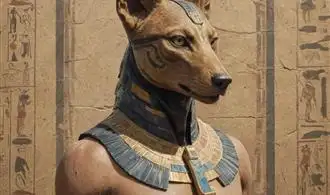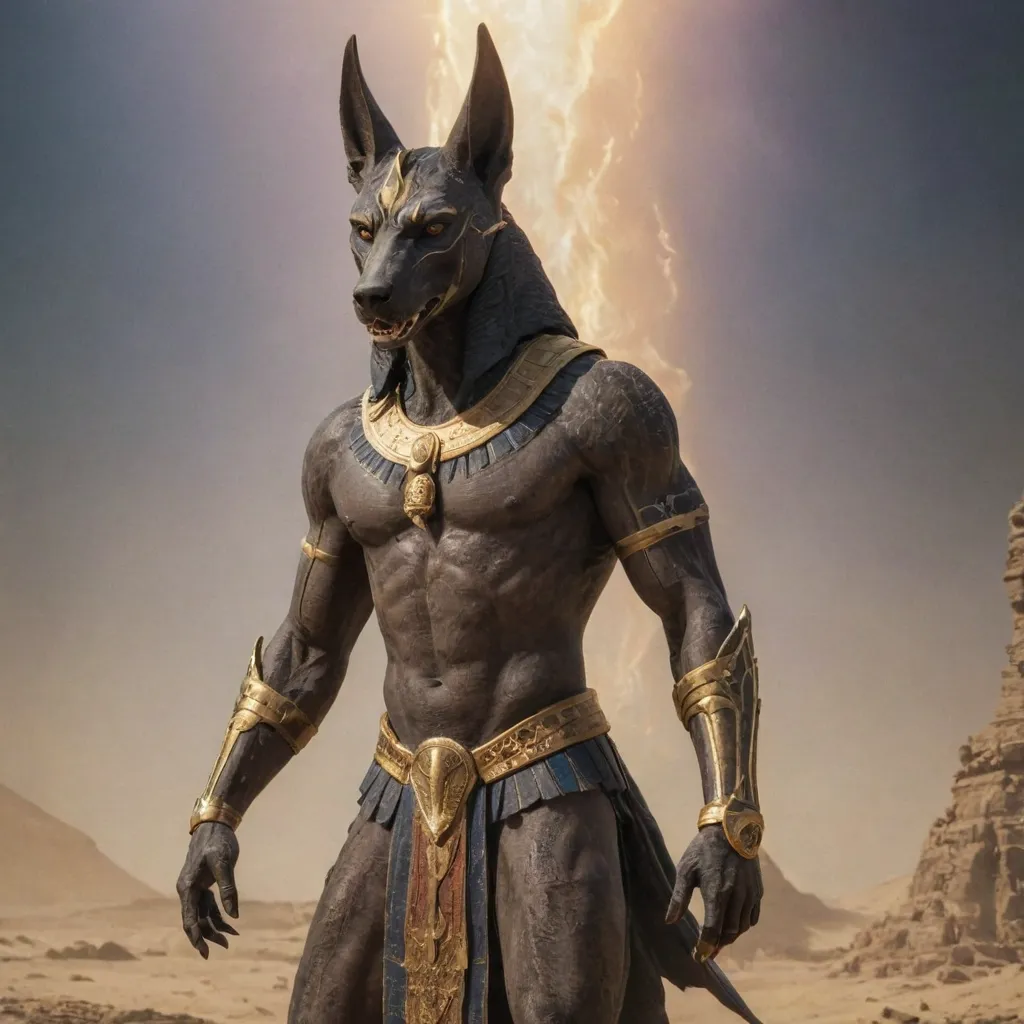
The Legend of Anubis
Anubis, the ancient Egyptian god of the dead, has captivated the imagination of people for millennia. As the guardian of the underworld, Anubis played a crucial role in the afterlife journey of the deceased. His legend is steeped in mystery, symbolism, and a profound understanding of the delicate balance between life and death.
Anubis was believed to be the son of the gods Osiris and Nephthys, or the illegitimate son of Osiris and Anath. His unique position as the gatekeeper of the underworld gave him the responsibility of overseeing the embalming process and guiding the souls of the dead through the perilous journey to the afterlife. This role was of utmost importance, as the ancient Egyptians believed that the successful transition to the afterlife was crucial for the continuation of one's existence.
One of the most iconic and recognizable aspects of Anubis is his distinctive jackal-headed appearance. This visual representation was not merely symbolic but deeply rooted in the ancient Egyptian belief system. The jackal was revered for its association with death and the underworld, as these animals were often observed scavenging in cemeteries and near burial sites. Anubis' jackal-like features were seen as a physical embodiment of his role as the guardian of the dead.
In the embalming process, Anubis played a central role. He was believed to have overseen the mummification of the deceased, ensuring that the body was properly prepared for the afterlife. This meticulous process involved the removal of internal organs, the drying of the body, and the wrapping of the remains in linen. Anubis' presence during this ritual was seen as a guarantee of the deceased's successful passage to the next life.
The legend of Anubis also encompasses his role in the judgment of the dead. In the Hall of Judgment, Anubis weighed the heart of the deceased against the feather of Ma'at, the goddess of truth and justice. If the heart was found to be pure and the individual's deeds were righteous, the soul was granted passage to the afterlife. However, if the heart was heavy with sin, it was devoured by the monstrous creature Ammit, condemning the soul to eternal oblivion.
Anubis' influence extended beyond the realm of the dead, as he was also invoked for protection and guidance in the mortal world. He was believed to have the power to ward off evil spirits and to provide comfort and support to those who faced their own mortality. The ancient Egyptians often sought Anubis' intercession in times of crisis, hoping that his divine presence would help them overcome their fears and struggles.
The Role of Anubis in Mythology
Anubis, the Egyptian god of the dead, holds a significant place in the ancient Egyptian pantheon. As the guardian of the underworld, Anubis played a crucial role in the afterlife rituals and beliefs of the ancient Egyptians. His unique position as the embalmer and protector of the dead has made him a figure of great importance in Egyptian mythology.
In the Egyptian funerary tradition, Anubis was responsible for the embalming and mummification process. He was believed to oversee the complex rituals and procedures that were carried out to prepare the deceased for their journey to the afterlife. Anubis was often depicted as a jackal-headed deity, a symbolic representation of his role as the guide and protector of the dead.
The role of Anubis in the Egyptian underworld was also central to the judgment of the dead. According to the mythological beliefs, Anubis would weigh the heart of the deceased against the feather of Ma'at, the goddess of truth and justice. This process, known as the "Weighing of the Heart," determined the fate of the individual in the afterlife. If the heart was found to be pure and true, the person would be deemed worthy of eternal life in the afterworld.
In addition to his role in the afterlife rituals, Anubis was also associated with the protection of the living. He was believed to have the power to guide and protect individuals during their lifetimes, particularly in moments of transition or vulnerability. This aspect of Anubis' mythology has led to him being revered as a deity who can help individuals conquer their fears and overcome challenges.
Anubis and the Afterlife
Anubis, the ancient Egyptian god of the dead, played a crucial role in guiding the souls of the deceased through the intricate journey of the afterlife. As the jackal-headed deity, Anubis was responsible for overseeing the mummification process, ensuring the proper preservation of the body, and facilitating the transition from the physical world to the realm of the divine.
One of the most significant aspects of Anubis' role in the afterlife was his involvement in the judgment of the dead. The Egyptian Book of the Dead, a collection of spells and rituals, describes the process of the "Weighing of the Heart," where the deceased's heart was weighed against the feather of truth. Anubis presided over this crucial moment, ensuring that the individual's deeds and actions in life were carefully evaluated before they could be granted passage to the afterlife.
The concept of the afterlife in ancient Egyptian mythology was complex and multifaceted. Anubis was believed to guide the deceased through the various stages of the journey, protecting them from the dangers and challenges they might encounter. This included guiding the soul through the underworld, known as the Duat, and ensuring the safe passage of the deceased to the realm of the gods.
Interestingly, Anubis was also associated with the process of mummification, which was crucial for preserving the physical body in preparation for the afterlife. The jackal-headed deity was responsible for overseeing the embalming process, ensuring that the body was properly prepared for its journey into the afterlife.
In addition to his role in the afterlife, Anubis was also revered as a deity who could help the living conquer their fears and anxieties. The ancient Egyptians believed that by invoking the power of Anubis, they could find the courage and strength to face their darkest fears and overcome the challenges they encountered in life.
Conquering Fears with the Help of Anubis
Anubis, the Egyptian god of the dead, is often associated with the ability to help individuals conquer their deepest fears. As the guardian of the afterlife, Anubis possesses a unique understanding of the human psyche and the powerful role that fear plays in shaping our lives. By delving into the mythology and symbolism surrounding Anubis, we can uncover the profound ways in which this deity can guide us towards overcoming our most daunting personal challenges.
Conquering Fears with the Help of Anubis is a journey of transformation, where the darkness of fear gives way to the light of courage and resilience. Anubis, with his keen eye for the hidden truth and his unwavering presence in the face of the unknown, offers a powerful ally to those who seek to confront their deepest anxieties. By drawing upon the ancient wisdom and the calming presence of this deity, individuals can embark on a deeply personal and meaningful process of self-discovery and empowerment.
At the heart of Anubis' ability to help conquer fears lies his role as the protector of the dead and the guardian of the afterlife. This connection to the realm beyond the physical world grants Anubis a unique perspective on the nature of fear and its impact on the human experience. By cultivating a relationship with Anubis, individuals can tap into a wellspring of courage, resilience, and a profound understanding of the cyclical nature of life and death.
One of the ways in which Anubis can assist in conquering fears is by guiding individuals through the The Fear of Failure with Anubis and the Afterlife. This process involves confronting the deep-seated anxieties that often arise from the fear of failure, and learning to embrace the transformative power of loss and transition. Anubis, as the overseer of the afterlife, can help individuals navigate the complex emotions and challenges associated with failure, offering a path towards personal growth and renewed purpose.
Additionally, Anubis' role as the psychopomp, the guide of souls, can be instrumental in helping individuals overcome their fears of the unknown and the unseen. By cultivating a deeper connection with Anubis, individuals can develop a greater sense of trust and surrender, allowing them to face their fears with a newfound sense of clarity and understanding. This can be particularly beneficial for those who struggle with anxiety, phobias, or a general sense of unease in the face of the mysteries of life and death.


